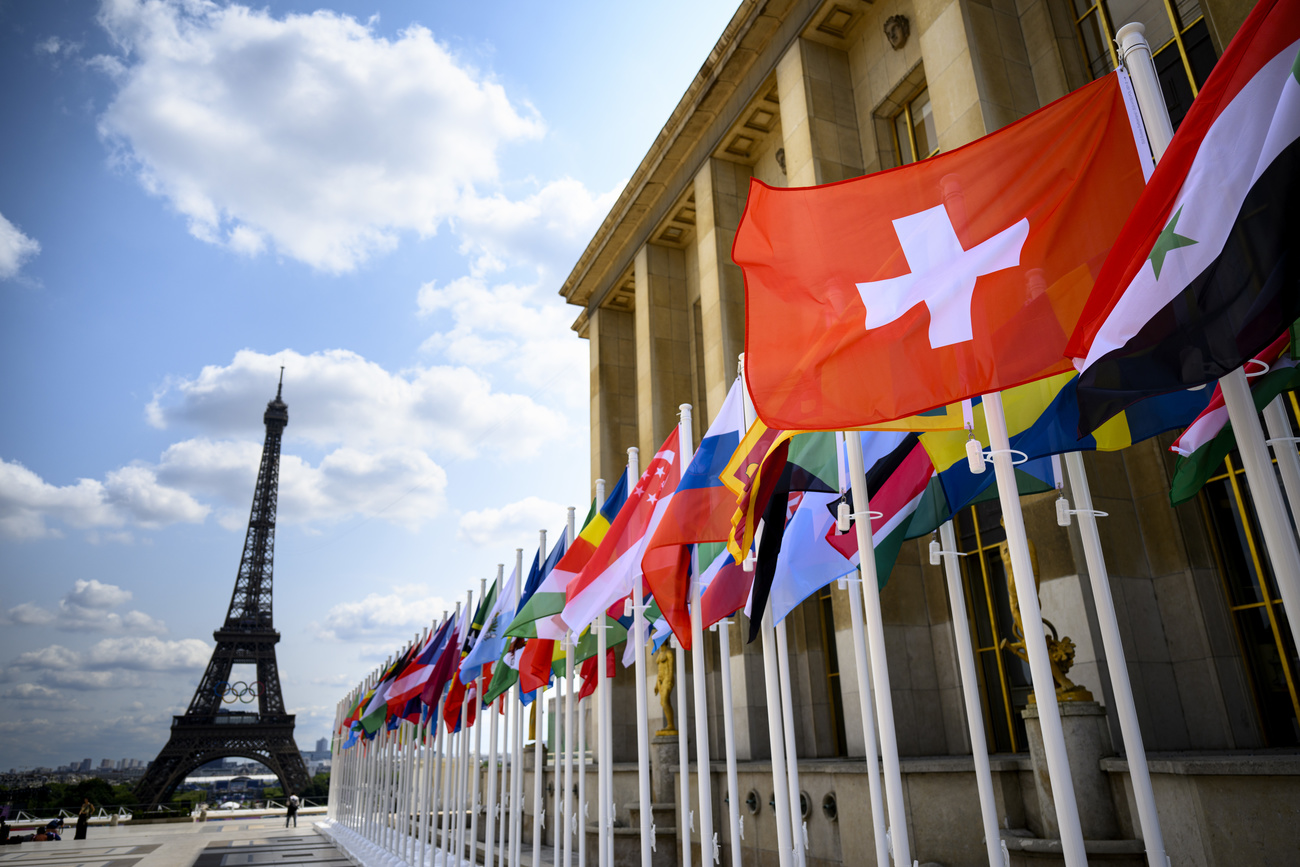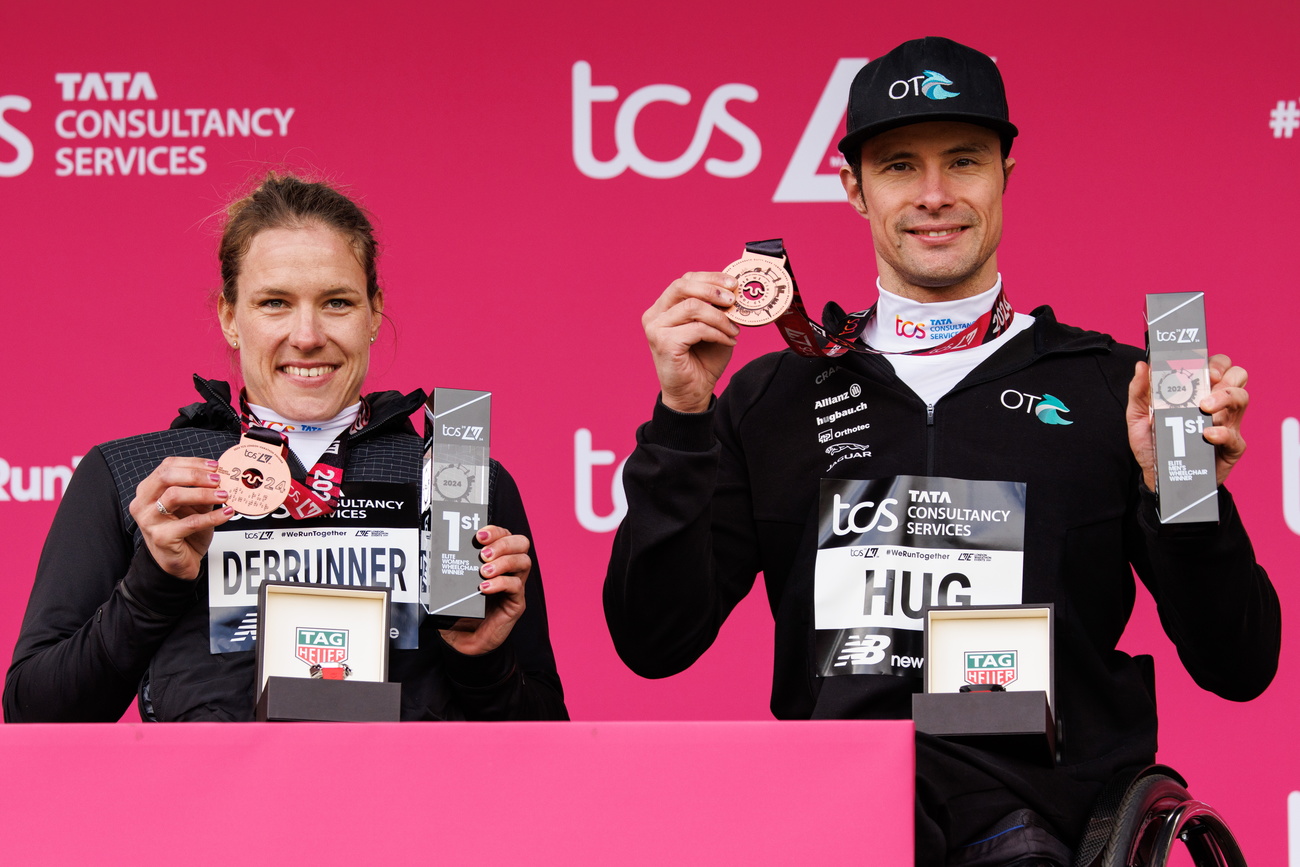Faster, higher, stronger, Swisser: let the 2024 Olympic Games begin!

On Friday evening 128 Swiss athletes will float down the River Seine in Paris as part of the opening ceremony for the 2024 Summer Olympics.
The 66 men and 62 women will be joined by more than 10,000 other elite athletes, who over the next fortnight will be fighting it out for 329 medals in 32 sportsExternal link.
Rifle shooter Nina Christen and cross-country cyclist Nino Schurter, both Olympic gold medallists, will be carrying the flag on the Swiss boat.
“We’re ready and well prepared,” Ralph Stöckli, head of the biggest Swiss delegationExternal link since Los Angeles in 1984, told the Swiss News Agency Keystone-SDA. However, after the Swiss excelled themselves by pocketing 13 medals in Tokyo three years ago, this time Stöckli hasn’t set a medal target for the 24 disciplines in which the Swiss are taking part. No Swiss is in the running – or spinning and flipping – for a medal in breakdancing, which is making its Olympic debut.
“Let’s be realistic: on average, Switzerland has won five medals in the Summer Games since 1972 and has never achieved a double-digit figure apart from Tokyo,” he said. “I think we can take inspiration from the 2016 Summer Games, which were also a success.” So he’d be happy equalling the seven medals the Swiss won in Rio.
However, the focus seems to have shifted slightly away from a fixation on medals. “Medals and diplomas [awarded to top-eight finishers] are still the big goal for many of our athletes, federations and Swiss Olympic,” Stöckli said. But an “intensive discussion” is currently being held with the federations on the subject of ethics and medal targets, he said. The gist seems to be that success should not be pursued by any means necessary.
Two goals are important to Stöckli: athletes should be offered “the best possible conditions for top performances on and off the pitch”, and they should be “proud ambassadors of top-class Swiss sport”.

‘Not sightseeing’
Ten Swiss athletes in Paris have already won Olympic medals, including equestrian Steve Guerdat, who will be competing in his sixth Olympic Games (Canadian equestrian Ian Millar took part in a record ten Games). That said, more than half the Swiss delegation are Olympic newbies.
The oldest Swiss participant is also an equestrian, 61-year-old Pius Schwizer, while the youngest is artistic gymnast Lena Bickel, 19. The average age of the Swiss sports delegation is 27. Twenty-two of Switzerland’s 26 cantons are represented.

Tennis player Stan Wawrinka, who won gold with Roger Federer in Beijing in 2008, will be taking part in his third Olympic Games. He says he’s a bit like the “big brother” of the Swiss delegation – “that sounds better than ‘old man’,” he laughs. “I’m very happy to still have this chance at the age of 39.”
Swimmer Jérémy Desplanches, 29, who won a bronze in Tokyo and will retire after Paris, probably spoke for all Swiss athletes when he said he had been savouring every moment since arriving in the French capital “but I’m not here to go sightseeing”.
When it comes to being well-disciplined ambassadors, the Swiss are possibly well-placed since more than half the delegation are connected to the Swiss army. Sixty-seven of the 128 athletes are supported by the army’s elite sports promotion for training and competitions. This is a further increase since Tokyo.
In addition, 27 Swiss athletesExternal link will be taking part in the Paralympics, being held from August 28 to September 8. Swiss Paralympic said the largest delegation since 2008 – which includes wheelchair legends Marcel Hug and Catherine Debrunner – will be aiming for the 14 medals won in Tokyo.

More
Swiss wheelchair athletes triumph in London Marathon
First female Olympic champion
Historically, Swiss athletes perform well in Paris. In 1900, at the second modern Olympics, the Swiss went home empty-handed in events such as fishing, ballooning and croquet, but they ended up with six golds – five in shooting and one in sailing, for the first female Olympic champion.
Hélène de Pourtalès was a Swiss-American countess who was passionate about horses and sailing. On May 22, 1900, she boarded the Swiss yacht Lérina and sailed to gold in the 1-2 tonne class off Le Havre together with her husband, Hermann de Pourtalès, and his nephew Bernard. Her performance made her not only the first female to participate at the Olympics but also the first woman to win a medal. The following day, her crew won silver in the second 1-2 tonne regatta, making her the first female multiple medallist. (Two months later British tennis player Charlotte Cooper became the first female individual Olympic champion.)

More
Switzerland’s long Olympic adventure
Then on July 5, 1924, the Olympic Games opened in Paris for the second, and most recent, time. Switzerland’s 25 medals, including seven gold, remain the national record. The artistic gymnasts were the most successful with seven medals, followed by the rowers and wrestlers with five each, but it was the footballers who generated the most headlines. With victories against Lithuania, the Czech Republic, Italy and Sweden, the Swiss stormed into the final, with Max “Xam” Abegglen netting six goals. However, Uruguay’s wonder team, which became the first world champions six years later, were too strong for the Swiss.
Almost exactly 100 years later will the Swiss be inspired by these exploits? We’ll be reporting on any gold, silver or bronze that comes Switzerland’s way.
After 1900 and 1924, the Summer Olympic Games are being held in Paris for the third time; only London has also hosted the Games three times. In 2028, Los Angeles will host the Olympics for the third time.
The Paris 2024 Olympic and Paralympic Games will be the biggest event ever organised in France. The Games will take place from July 26 to August 11. The Paralympic Games will take place from August 28 to September 8. A total of 205 nations plus the IOC Refugee Olympic TeamExternal link are taking part.
Russia and Belarus are excluded from team sports, but some athletes have been invited to compete with “neutral” status.
One week before the opening ceremony, the official IOC database for the Paris Olympics showed 11,215 athletes, including backups, registered to compete: 5,712 in men’s events and 5,503 in women’s events (a 51-49%) split. Guam had the highest proportion of women (87.5%) – seven out of a team of eight. Six of the 205 official Olympic teams had no female athletes registered to compete: Belize, Guinea-Bissau, Iraq, Liechtenstein, Nauru and Somalia.
The registered entries to women’s events in Paris include two athletes who identify as nonbinary and transgender.
Medals will feature scrap metal from the Eiffel Tower taken during refurbishments and repairs.
For the first time since 2018, a Maison Suisse/House of SwitzerlandExternal link has been built as part of the Olympic and Paralympic Games.
The publicly accessible venue, in the garden of the Swiss embassy until August 11 and then between August 27 and September 8, will serve as a meeting point with food, activities and music. Visitors can also watch the Games and celebrate the medals won by the Swiss athletes.
An exhibition called “Liaisons suisses” presents 45 objects, spanning five centuries, from seven Swiss tourist regions. Highlights include Lucerne gallery owner Angela Rosengart’s spiral necklace, immortalised by Picasso, juxtaposed with the X-ray machine of the young Antoine de Saint-Exupéry, who studied in Fribourg. The legendary “Traccia” table (1936), designed in Ticino by Meret Oppenheim, and Lausanne designer Laure Gremion’s project for the world’s largest absinthe fountain are just a few more examples of the treasures on display.

More
Swiss Olympic success – and failure – over the years
Edited by Balz Rigendinger

In compliance with the JTI standards
More: SWI swissinfo.ch certified by the Journalism Trust Initiative









You can find an overview of ongoing debates with our journalists here . Please join us!
If you want to start a conversation about a topic raised in this article or want to report factual errors, email us at english@swissinfo.ch.